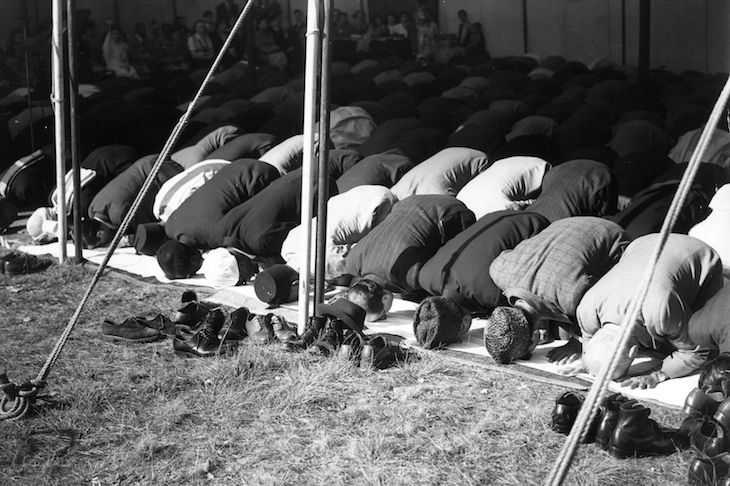In all the agonising about Islamism, and what to do about it, it would be a mistake to forget a very useful fact: that Britain has a special relationship with Islam and has done for centuries. The friendship with Islam is unique.
Spain was home to Andalusia, a Muslim empire for 700 years. The Germans, Poles and Austrians saw off Turkish Muslim invaders in the Siege of Vienna in 1529 and then again at the Battle of Vienna in 1683. The French lived in the shadow of 732 and the Battle of Poitiers. Britain alone, cut off from Catholic Europe, forged a relationship with Muslims built on trade, the rule of law, mutual respect and an exchange of ideas and cultures. It would be a terrible shame to forget this friendship now.
It was Queen Elizabeth I who did more than anyone to cultivate this relationship. During the Reformation, what might be considered the first Brexit, England was isolated by Europe’s Catholic monarchs and, in 1570, Elizabeth was excommunicated by Pope Pius V. The Protestant Queen refused to bow to European intimidation so she found new and willing allies in the Muslim Ottomans, then a 400-year-old empire with territories in the Balkans, North Africa, central Asia and the Middle East.
Sultan Murad III wrote to Queen Elizabeth, issuing a new law for his subjects, that if ‘her agents and merchants shall come from the domain of Anletar by sea with their barks and with their ships, let no one interfere’. This imperial edict, the rule of law, facilitated British trade in Ottoman trades and ports.
Ottoman protection of British ships and commercial envoys helped England thrive despite the boycott by European powers. The consolidation of Protestantism, free trade, and free inquiry in England that led to the Enlightenment had something to do with the Ottoman-Elizabethan pact. By the end of her reign, English traders, diplomats, adventurers, and others lived or travelled through places such as Istanbul, Damascus, Fallujah, Aleppo, Raqqa, Algiers, Baghdad and Tripoli. The Queen was said to like Moroccan sugar so much that her teeth became quite black with decay.
The merchants who left England, writes the historian Jerry Brotton, transformed Elizabethan homes. The wealthy filled their houses with Turkish carpets, silk quilts and embroidered tapestries. The language of 16th-century England was filled with Arabic: ‘sugar’ from sukkar, ‘crimson’ from kirmiz, ‘tulip’ from tulband. The English fascination with Islam and Muslims did not end with the Elizabethans. In 1650, a Greek-Turk named Pasqua Rosee opened the first coffee house in the City of London. It was pious Muslims from Yemen who spread the drinking of coffee within the Ottoman Empire, to help believers stay awake at night for worship of Allah. In Arabic, qahwah, or kehve in Turkish, became ‘coffee’ in English. Samuel Pepys visited the coffee house in 1660 and wrote ‘the first time that ever I was there, and I found much pleasure in it’.
During the Victorian era, hundreds of thousands of Muslims served in the British armed forces. During the Crimean war, Ottoman Muslims fought together with the British against the Russians. It was in Constantinople that Florence Nightingale invented the art of nursing. Queen Victoria’s government was proud to remind the Ottoman sultan that she was an empress of more Muslims than he. Britain’s first purpose-built mosque was in 1889 in Woking, Surrey.
Most importantly, it was Queen Victoria’s patronage of and closeness to Munshi Abdul Karim that shows a warmth at the highest levels of British society towards Muslims. As part of the royal household, this pious Indian taught her Urdu, the poetry of Rumi, and gave her spiritual comfort. The 2017 feature film Victoria and Abdul captured some of the depth of that relationship.
Too often, too, we forget that half a million Muslims fought with Britain in the first world war and died in the trenches for God, King and Empire. That generation held these values worthy of the ultimate sacrifice.
In the reign of Queen Elizabeth II, almost four million Muslims from the Empire and then the Commonwealth have made Britain our home. The freedom to worship and thrive here in Britain is unmatched by any other country. It was this freedom that drew my Muslim parents to this country. The raison d’être of Islamic civilisations and the shariah for a thousand years was to provide five things: security, worship, preservation of the family, nourishment of the intellect and protection of property. These are called maqasid, or the higher objectives of the shariah. Britain provides these in multitudes for every Muslim today. There is no French tradition of laicité or hostility to Islam in modern British history.
Today’s Islamist fanatics, who see conspiracies here and long for a shariah state, are mad. This country is fully Quran–compliant. The Christian ethos that shaped Britain is a cause for celebration, not rejection. Today, ‘Islamophobia’ is a terrible oxymoron which allows many British Muslims to wallow in unwarranted victimhood. There is no phobia against Islam, simply against terrorism.
Rich in history, tradition, trade, the rule of law, education, and parliamentary democracy, this island still has much to offer to the world of Islam — if we can strengthen and not abandon our old friendship.






Comments